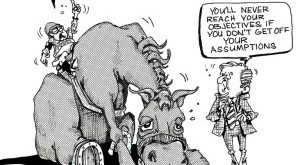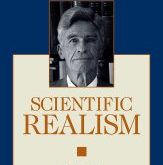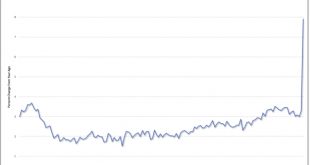from Norbert Häring Distributing additional money to stimulate demand is seen by economists as a recipe for boosting demand in a crisis. But you have to do it right, not like Donald Trump did it. In response to the corona crisis, US President Donald Trump had consumption cheques with his signature worth 1200 dollars sent to all citizens. This bears a strong resemblance to an anti-crisis recipe of economists, which has been known as helicopter money since Milton Friedman coined this term....
Read More »Corporate university—pandemic edition
from David Ruccio Will colleges and universities reopen in the fall? That’s the question on the minds of many these day—administrators, faculty, staff, students, and their families, not to mention the communities in which they live. All institutions of higher education (in the United States and in much of the rest of the world) had a difficult spring, having to close their campuses for in-person instruction (as well as many other activities, from athletics to study-abroad programs) in...
Read More »Open thread May 27, 2020
Economic models and reality
from Lars Syll The abandonment of efforts to match real structures has led to disaster, as models of economic theory have grown progressively distant from reality. Attempts to fix the problem have failed to address the cause. Economists look at bad models, and say we should replace these by better models. But the process by which models are evaluated, the underlying methodology, is not examined. The real problem lies much deeper than bad models and ludicrous assumptions. Bad assumptions...
Read More »Rational choice theory — an abysmal failure
Lars Syll Though an enthusiast of reason, I believe that rational choice theory has failed abysmally, and it saddens me that this failure has brought discredit upon the very enterprise of serious theorizing in the field of social study … Rational choice theory is far too ambitious. In fact, it claims to explain everything social in terms of just three assumptions that would hold for all individuals in all social groups and in every historical period. But a Theory of Everything does not...
Read More »The sure way to end concerns about China’s “theft” of a vaccine: Make it open
from Dean Baker In the last couple of weeks both the New York Times and National Public Radio have warned that China could steal a vaccine against the coronavirus, or at least steal work in the U.S. done towards developing a vaccine. Both outlets obviously thought their audiences should view this as a serious concern. As I wrote previously, it is not clear why those of us who don’t either own large amounts of stock in drug companies or give a damn about Donald Trump’s ego, should be upset...
Read More »Open thread May 22, 2020
How economic models became substitutes for reality
from Asad Zaman The problem at the heart of modern economics is buried in its logical positivist foundations created in the early twentieth century by Lionel Robbins. Substantive debates and critiques of the content actually strengthen the illusion of validity of these methods, and hence are counterproductive. As Solow said about Sargent and Lucas, you do not debate cavalry tactics at Austerlitz with a madman who thinks he is Napoleon Bonaparte, feeding his lunacy. Modern macroeconomic...
Read More »Who’s been laid off?
David Ruccio If we needed any more confirmation of who’s been laid off during the current crisis, all we need to do is examine the change in average hourly wages in the United States. In the past month (so, April 2020), the year-over-year increase in hourly wages jumped to 7.9 percent. That’s more than three times the average increase since 2008 (2.5 percent) and more than two and half times the increase since Donald Trump took office (3 percent). That doesn’t mean American workers are...
Read More »Econometrics — a Keynesian perspective
from Lars Syll It will be remembered that the seventy translators of the Septuagint were shut up in seventy separate rooms with the Hebrew text and brought out with them, when they emerged, seventy identical translations. Would the same miracle be vouchsafed if seventy multiple correlators were shut up with the same statistical material? And anyhow, I suppose, if each had a different economist perched on his a priori, that would make a difference to the outcome. J M Keynes Mainstream...
Read More » Heterodox
Heterodox




